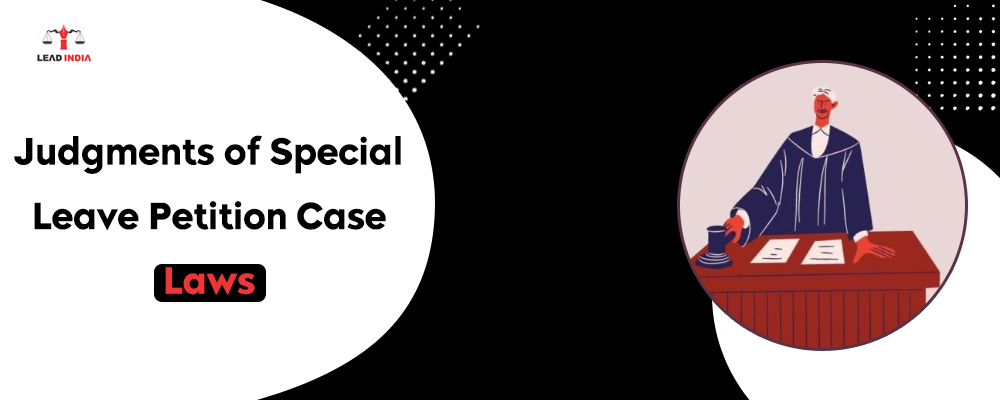If you’re wondering why this SLP is so significant, keep in mind that it is just because it grants the Supreme Court of India extraordinary jurisdiction because it can only be filed there. According to Article 136 (SLP), the Supreme Court has extraordinary jurisdiction and may, without any constraints or limitations, issue special leave to appeal from any judgment, decree, resolution, sentence, or order made by any court or tribunal in India in any subject.
What is a Special Leave Petition?
- The term “Special Leave Petition” was borrowed from the 1935 Government of India Act.
- The resentful party may request a special hearing in the Supreme Court to contest any decision, decree, order, or sentence issued by a court or tribunal operating within the borders of India.
- Applications for special leave are not applicable in instances that are tried in a court-martial or military court. The UK Constitution was the source of this exception.
- The Indian Constitution gives the Supreme Court the privilege of hearing special leave petitions; nevertheless, this is not a right that is guaranteed to Indian citizens. Orders that are intermediate or final are subject to Article 136 of the Indian Constitution.
- If the high court declines to issue a certificate of fitness for an appeal to the Supreme Court of India pursuant to Article 134A of the Indian Constitution, a Special Leave Petition may also be filed.
Need A Legal Advice
The internet is not a lawyer and neither are you. Talk to a real lawyer about your legal issue

Important Special Leave Petition Case Laws
The important rulings of Special Leave Petition Case Laws are as follows:
Special Leave Petition Case Laws on “Rajendra Kumar v State”:
- In the present case, the Chief Judicial Magistrate’s (CJM) ruling was challenged by an SLP before the SC. The appellant went to the Supreme Court rather than the High Court.
- Furthermore, the Supreme Court consented to grant an exemption by admitting the Special Leave Petition, which was only heard and not approved.
- However, the Supreme Court clarified that the Chief Judicial Magistrate is not subject to a Tribunal’s jurisdiction and that a petition of this nature would often not be granted.
Special Leave Petition Case Laws on “Smt. Tej Kumari v CIT”:
- The Patna High Court’s Full Bench ruled that if an SLP is summarily rejected or dismissed in accordance with Article 136 of the Constitution, no laws would be established by that dismissal.
- Res-judicata would not apply to the High Court’s ruling, which the SLP dismissed from the beginning. Nonetheless, if the Supreme Court dismisses an SLP for a valid reason, it could be interpreted as a confirmation of the High Court’s conclusions regarding the case’s merits.
- For this reason, there is no need to lessen the precedents’ legally binding status in these situations.
Special Leave Petition Case Laws on “Kunhayammed v State of Kerala”:
- Regarding this particular case, the subject of the dispute was whether Article 136’s exercise of authority included awarding the SLP and then considering the appeal.
- The court may choose to grant the Special Leave Petition, and if it chooses against doing so based on its findings, the court’s appellate jurisdiction is nullified.
- The simple rejection of the SLP petition, however, does not imply res judicata; rather, it only indicates that the matter was unsuitable for an SLP grant, and the aggrieved party may still request a review under Article 226 from the relevant court.
Special Leave Petition Case Laws on “Mathai Joby v. George”:
- The court noted that even in cases when the contested order contains a factual or legal error, Article 136, like Article 226, is a discretionary remedy, and the court is not required to intervene.
- The language used in Article 136 makes it quite evident that it only gives the Supreme Court the authority to intervene in extraordinary circumstances, rather than bestowing an appeal right on to any party.
- The court further noted that cases under Article 136 should be submitted in accordance with wide criteria established by a constitutional bench.
If you want to know about how you can file a special leave petition before the Supreme Court and search it through various special leave petition case laws, you can get in touch with a lawyer to know the details.
For any type of legal assistance, one can speak with a lawyer from Lead India. Lead India provides free online legal advice in India. With Lead India, one can ask free online questions of the experts in addition to getting free legal advice.





 Talk to a Lawyer
Talk to a Lawyer